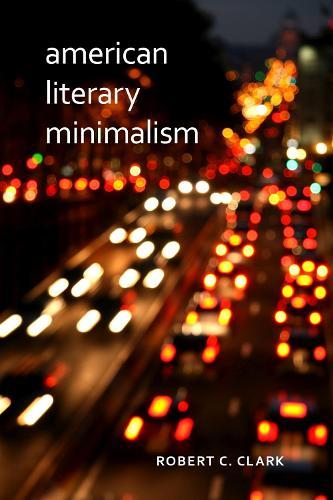Full Product Details
Author: Robert C. Clark
Publisher: The University of Alabama Press
Imprint: The University of Alabama Press
Edition: 2nd ed.
Dimensions:
Width: 15.20cm
, Height: 2.50cm
, Length: 22.90cm
Weight: 0.461kg
ISBN: 9780817318277
ISBN 10: 0817318275
Pages: 200
Publication Date: 31 January 2015
Audience:
College/higher education
,
Undergraduate
,
Postgraduate, Research & Scholarly
Format: Hardback
Publisher's Status: Active
Availability: Available To Order

We have confirmation that this item is in stock with the supplier. It will be ordered in for you and dispatched immediately.
Reviews
Robert Clark's American Literary Minimalism is an excellent, rich, and long overdue study because it takes the reader through what Clark sees as the nexus that creates the style, past Ernest Hemingway and then into Carver, and on through McInerney, Minot, Cisneros, and McCarthy. It gives the reader a bevy of ideas to pull from in any subjective definition of 'minimalism, ' and makes clear what Clark himself finds important. --Linda Wagner-Martin, author of A History of American Literature: 1950 to the Present
More of a literary mode than a movement, minimalism has always gotten short shrift, for reasons that are obvious enough: there seems something deceptively paradoxical about going into depth into a style that prides itself on brevity and concision. Robert Clark's American Literary Minimalism goes a long way toward redressing that presumption while also correcting the prejudices that proliferated against the mode throughout the 1980s. Clark makes an important argument about the tradition of minimalism, linking Raymond Carver in particular to the 'no scrollwork' school of Hemingway and demonstrating, through accompanying readings of Susan Minot, Sandra Cisneros, and Cormac McCarthy, that notions of omission, precision, and economy are expressed through a far wider variety of means and themes than the stereotype of Kmart realism or dirty realism or any other reductive term critics could conjure up. --Kirk Curnutt, author of The Cambridge Introduction to F. Scott Fitzgerald and Wise Economies: Brevity and Storytelling in American Short Stories
. . . Clark's showcase of minimalism in American fiction holds much value for those enrolled in creative writing courses, who will benefit from the foundation in minimalism Clark provides, and those in American literature courses that cover the works critiqued. Recommended. --CHOICE More of a literary mode than a movement, minimalism has always gotten short shrift, for reasons that are obvious enough: there seems something deceptively paradoxical about going into depth into a style that prides itself on brevity and concision. Robert Clark's American Literary Minimalism goes a long way toward redressing that presumption while also correcting the prejudices that proliferated against the mode throughout the 1980s. Clark makes an important argument about the tradition of minimalism, linking Raymond Carver in particular to the 'no scrollwork' school of Hemingway and demonstrating, through accompanying readings of Susan Minot, Sandra Cisneros, and Cormac McCarthy, that notions of omission, precision, and economy are expressed through a far wider variety of means and themes than the stereotype of Kmart realism or dirty realism or any other reductive term critics could conjure up. --Kirk Curnutt, author of The Cambridge Introduction to F. Scott Fitzgerald and Wise Economies: Brevity and Storytelling in American Short Stories Robert Clark's American Literary Minimalism is an excellent, rich, and long overdue study because it takes the reader through what Clark sees as the nexus that creates the style, past Ernest Hemingway and then into Carver, and on through McInerney, Minot, Cisneros, and McCarthy. It gives the reader a bevy of ideas to pull from in any subjective definition of 'minimalism, ' and makes clear what Clark himself finds important. --Linda Wagner-Martin, author of A History of American Literature: 1950 to the Present
Author Information
Robert C. Clark received his PhD in American literature from the University of Georgia, USA. His recent publications include articles on Ernest Hemingway, Alice Dunbar-Nelson, María Cristina Mena, and Raymond Carver. His current research deals with transpacific minimalism, naturalism, and fiction of the twenty-first-century global financial crisis. He teaches at the University of West Alabama, USA.




